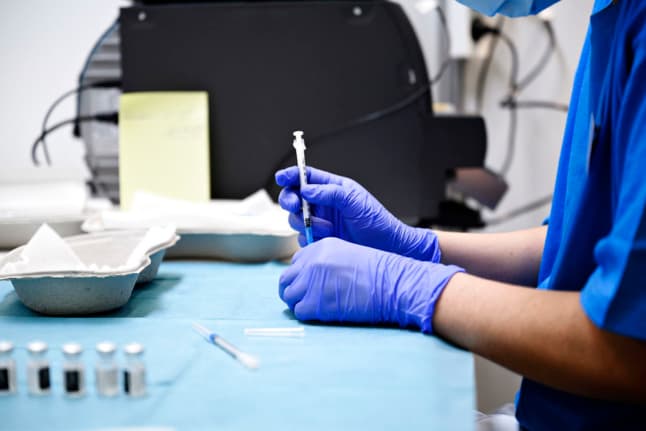Denmark gives woman compensation for Covid-19 vaccine side effects

A 30-year-old woman from the Greater Copenhagen region has become the first person in Denmark to receive compensation for side effects caused by Covid-19 vaccination.
The woman was affected by the rare, but serious blood clots technically known as vaccine-induced immune thrombotic thrombocytopenia (VITT) after receiving the vaccine from AstraZeneca, the Danish patient compensation board (Patienterstatningen) confirmed to newspaper Politiken .
“After reading the woman’s patient records, there was no doubt,” the board’s director Karen-Inger Bast told the newspaper.
She was hospitalised after receiving the vaccine in January. She experiences severe headaches a few days after being given the jab and was later diagnosed with blood clots in her brain and liver. She was subsequently diagnosed with VITT.
The compensation body upheld her claim that the blood clots with which she was diagnosed were related to the vaccine.
“VITT was confirmed and the case was approved because there was a specific set of signs and symptoms which are a rare and serious side effect after (AstraZeneca) vaccination against Covid-19. There is a clear causation link,” Bast said.
So far, the compensation board has ruled the woman can be compensated for sick days from work by discomfort caused by the side effects.
She could also be entitled to further compensation should she suffer longer-term issues related to the side effects.
Because she was given the vaccine in connection with her job, she also has a potential claim for compensation for workplace injury, Politiken writes.
“If she has long-term cognitive injuries after the blood clots, compensation could reach several hundred thousand kroner,” Bast told the newspaper.
The patient compensation board is currently processing 158 claims relating to side effects from coronavirus vaccines.
Of these, 115 relate to the AstraZeneca vaccine, while 38 are from Pfizer vaccinations and 5 from Moderna.
“Patients and doctors should know that (the compensation board) covers all serious side effects from approved vaccines. That includes the Covid-19 vaccines from AstraZeneca and Johnson & Johnson, even though they have been withdrawn from the vaccination programme,” Bast said.
“Generally, we often see injuries from vaccination. We also see them from, for example, vaccination against influenza and children’s diseases. That’s also how it will be with Covid-19, with up to 5 million people being vaccinated,” she added, stressing that this is “incredibly unfortunate for the individual, which is why it’s good that compensation is possible”.
READ ALSO: Danish company to open first Covid-19 vaccination centre for opt-in scheme
Comments (1)
See Also
The woman was affected by the rare, but serious blood clots technically known as vaccine-induced immune thrombotic thrombocytopenia (VITT) after receiving the vaccine from AstraZeneca, the Danish patient compensation board (Patienterstatningen) confirmed to newspaper Politiken .
“After reading the woman’s patient records, there was no doubt,” the board’s director Karen-Inger Bast told the newspaper.
She was hospitalised after receiving the vaccine in January. She experiences severe headaches a few days after being given the jab and was later diagnosed with blood clots in her brain and liver. She was subsequently diagnosed with VITT.
The compensation body upheld her claim that the blood clots with which she was diagnosed were related to the vaccine.
“VITT was confirmed and the case was approved because there was a specific set of signs and symptoms which are a rare and serious side effect after (AstraZeneca) vaccination against Covid-19. There is a clear causation link,” Bast said.
So far, the compensation board has ruled the woman can be compensated for sick days from work by discomfort caused by the side effects.
She could also be entitled to further compensation should she suffer longer-term issues related to the side effects.
Because she was given the vaccine in connection with her job, she also has a potential claim for compensation for workplace injury, Politiken writes.
“If she has long-term cognitive injuries after the blood clots, compensation could reach several hundred thousand kroner,” Bast told the newspaper.
The patient compensation board is currently processing 158 claims relating to side effects from coronavirus vaccines.
Of these, 115 relate to the AstraZeneca vaccine, while 38 are from Pfizer vaccinations and 5 from Moderna.
“Patients and doctors should know that (the compensation board) covers all serious side effects from approved vaccines. That includes the Covid-19 vaccines from AstraZeneca and Johnson & Johnson, even though they have been withdrawn from the vaccination programme,” Bast said.
“Generally, we often see injuries from vaccination. We also see them from, for example, vaccination against influenza and children’s diseases. That’s also how it will be with Covid-19, with up to 5 million people being vaccinated,” she added, stressing that this is “incredibly unfortunate for the individual, which is why it’s good that compensation is possible”.
READ ALSO: Danish company to open first Covid-19 vaccination centre for opt-in scheme
Join the conversation in our comments section below. Share your own views and experience and if you have a question or suggestion for our journalists then email us at [email protected].
Please keep comments civil, constructive and on topic – and make sure to read our terms of use before getting involved.
Please log in here to leave a comment.